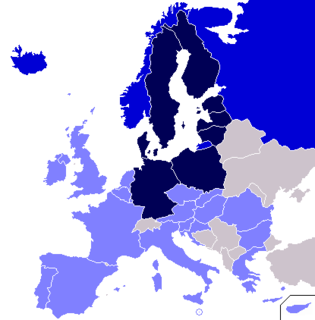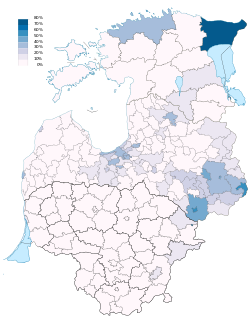Related Research Articles

Latvia, officially known as the Republic of Latvia,, is a country in the Baltic region of Northern Europe. It is one of the Baltic states; and is bordered by Estonia to the north, Lithuania to the south, Russia to the east, Belarus to the southeast, and shares a maritime border with Sweden to the west. Latvia covers an area of 64,589 km2 (24,938 sq mi), with a population of 1.9 million. The country has a temperate seasonal climate. Its capital and largest city is Riga. Latvians belong to the ethno-linguistic group of the Balts; and speak Latvian, one of the only two surviving Baltic languages. Russians are a prominent minority in the country, at some 24% of the population.

Lithuania is a country on the south-eastern shore of the Baltic Sea, a member of the United Nations Organisation, the Organisation for Security and Cooperation in Europe, the European Union, the North Atlantic Treaty Organisation, the World Trade Organisation. Currently, Lithuania maintains diplomatic relations with 182 states Lithuania became a member of the United Nations on 18 September 1991, and is a signatory to a number of its organizations and other international agreements. It is also a member of the Organization for Security and Cooperation in Europe, NATO and its adjunct North Atlantic Coordinating Council, the Council of Europe, and the European Union. Lithuania gained membership in the World Trade Organization on 31 May 2001.

The Council of the Baltic Sea States (CBSS) is a regional intergovernmental organisation working on three priority areas: Regional Identity, Safe & Secure Region and Sustainable & Prosperous Region. These three priority areas aim to address the themes of environment, economic development, entrepreneurship, education, culture, civil security, children's rights and trafficking in human beings.

The Baltic states, also known as the Baltic countries, Baltic republics, Baltic nations, or simply the Baltics, is a geopolitical term, typically used to group the three sovereign states on the eastern coast of the Baltic Sea: Estonia, Latvia, and Lithuania. The term is not used in the context of cultural areas, national identity, or language, because while the majority of people in Latvia and Lithuania are Baltic people, the majority in Estonia are Finnic. The three countries do not form an official union, but engage in intergovernmental and parliamentary cooperation. The most important areas of cooperation among the three countries are foreign and security policy, defence, energy, and transportation.

The University of Latvia is a state-run university located in Riga, Latvia established in 1919.

Artis Pabriks is a Latvian politician. Since January 2019 he has been the Minister for Defence and Deputy Prime Minister of Latvia. From 2014 to 2018, he was a Member of the European Parliament.

The Nasdaq Riga, formerly Riga Stock Exchange, is the sole stock exchange operating in Riga, Latvia. It is owned by Nasdaq, which also operates exchanges in the USA, Denmark, Sweden, Finland, Iceland, Armenia, Lithuania, and Estonia. Established in 1993.

Henning Christophersen was a Danish politician, a former Vice President of the European Commission (1985–1995), former leader of the Danish liberal party Venstre (1978–1984) and former member of the European Convention. Christophersen was one the early architects of the Single Market and the Euro.

Russians in the Baltic states describes self-identifying ethnic Russians and other primary Russian-speaking communities in Estonia, Latvia, and Lithuania, commonly referred to collectively as the Baltic states. In 2017, there were 1 million ethnic Russians in the Baltic States, having declined from 1.7 million in 1989, the year of the last census during the Soviet era.

Jüri Uluots was an Estonian prime minister, journalist, prominent attorney and distinguished Professor and Dean of the Faculty of Law at the University of Tartu.

Jón Baldvin Hannibalsson is an Icelandic politician and diplomat. He was Minister of Finance from 1987 to 1988 and Minister of Foreign Affairs from 1988 to 1995.

Algirdas Saudargas is a Lithuanian politician and the signatory of the Act of the Re-Establishment of the State of Lithuania. He was the first foreign minister of post-Soviet Lithuania. He was foreign minister from March 24, 1990, to December 12, 1992, and again from December 4, 1996, to October 30, 2000. In 1992, Algirdas Saudargas, together with 9 other Baltic Ministers of Foreign Affairs and an EU commissioner, founded the Council of the Baltic Sea States (CBSS) and the EuroFaculty.
Delfi is a major internet portal in Estonia, Latvia, and Lithuania providing daily news, ranging from gardening to politics. It ranks as one of the most popular websites among Baltic users.

Rail Baltica is an ongoing greenfield railway infrastructure project to link Finland, Estonia, Latvia, Lithuania with Poland and through this with the European standard gauge rail line network. Its purpose is to provide passenger and freight service between participating countries and improve rail connections between Central and Northern Europe. Furthermore, it is intended to be a catalyst for building the economic corridor in Northeastern Europe. The project envisages a continuous rail link from Tallinn (Estonia) to Warsaw (Poland). It consists of links via Riga (Latvia), Kaunas and Vilnius (Lithuania). Rail Baltica is one of the priority projects of the European Union: Trans-European Transport Networks (TEN-T).

Baltic Pride is an annual LGBT+ pride parade rotating in turn between the capitals of the Baltic states; Tallinn, Riga and Vilnius. It is held in support of raising issues of tolerance and the rights of LGBT community and is supported by ILGA-Europe. Since 2009 the main organisers have been Mozaīka, the National LGBT Rights Organization LGL Lithuanian Gay League, and the Estonian LGBT Association.

Estonia, officially the Republic of Estonia, is a country in Northern Europe. It is bordered to the north by the Gulf of Finland across from Finland, to the west by the Baltic Sea across from Sweden, to the south by Latvia, and to the east by Lake Peipus and Russia. The territory of Estonia consists of the mainland and of 2,222 islands on eastern coast of the Baltic Sea, covering a total area of 45,227 km2 (17,462 sq mi), and is influenced by a humid continental climate. Tallinn, the capital of Estonia, and Tartu are the largest cities and urban areas in the country. Other notable cities include Narva, Pärnu, Kohtla-Järve and Viljandi. The official language of the country, Estonian, is the second-most-spoken Finnic language.
Jānis Jurkāns is a Latvian politician, one of the leaders of the Latvian Popular Front, who served as foreign minister (1990–1992).

Nordic-Baltic Eight (NB8) is a regional co-operation format that includes Denmark, Estonia, Finland, Iceland, Latvia, Lithuania, Norway, and Sweden. Under NB8, regular meetings are held of the Baltic and Nordic countries' Prime Ministers, Speakers of Parliaments, Foreign Ministers, branch ministers, Secretaries of State and political directors of Foreign Ministries, as well as expert consultations where regional issues and current international topics are reviewed.

Terra Mariana was the official name for Medieval Livonia or Old Livonia. It was formed in the aftermath of the Livonian Crusade, and its territories were composed of present-day Estonia and Latvia. It was established on 2 February 1207, as a principality of the Holy Roman Empire, but lost this status in 1215 when Pope Innocent III proclaimed it as directly subject to the Holy See.

The Baltic states housing bubble is an economic bubble involving major cities in Estonia, Latvia and Lithuania. The Baltic States had enjoyed a relatively strong economic growth between 2000 and 2006, and the real estate sectors had performed well since 2000. In fact, in between 2005Q1 and 2007Q1, the official house price index for Estonia, Latvia and Lithuania recorded a sharp jump of 104.6%, 134.3% and 106.7%. By comparison, the official house price index for Euro Area increased by 11.8% for a similar time period.